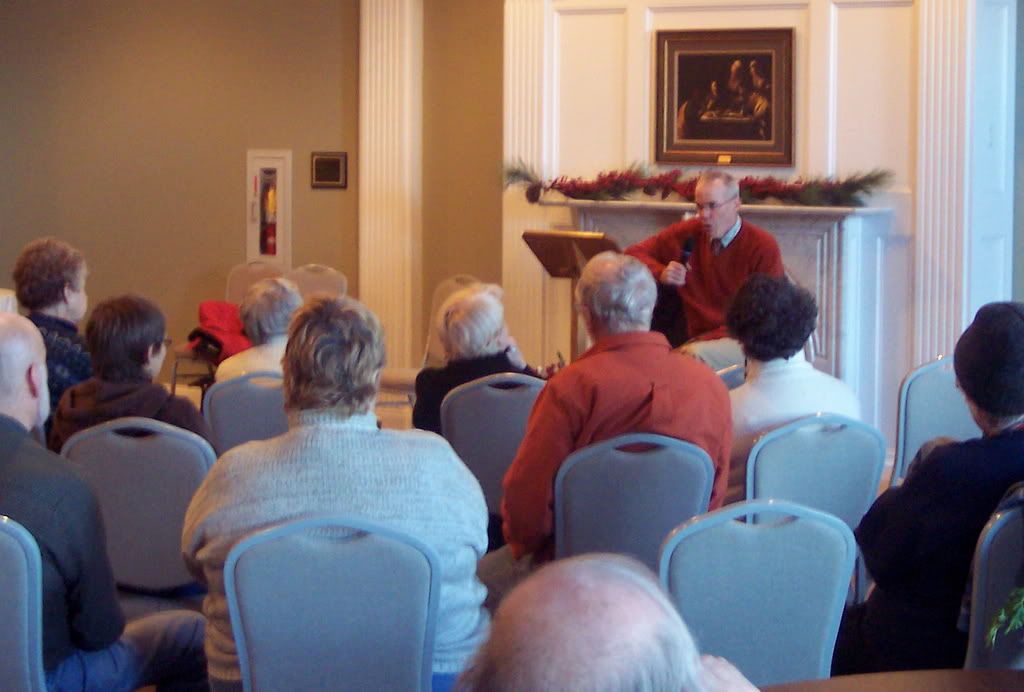(Turning off the upstairs lights now…)
I’m borrowing this stat from environmentalist and writer Bill McKibben, who spoke in my community today. McKibben, author of The End of Nature, is an amazing leader promoting action on global climate change. I didn’t even know he was in town until I saw a tiny little blurb in the newspaper while I was having my coffee. I threw on my jeans and flew out of the house at 8:50 to catch his 9:00 presentation.

His talk came just hours after the United Nations Conference reached its agreement on a global warming plan. McKibben discussed the earlier disagreements between the United States and the European Union over the worldwide response to climate change. Why the tension? The average European (we’re not talking about Tanzania here) uses HALF as much energy as the average American each year. Seriously…something to think about.
McKibben also wrote the introduction and annotations for a 2004 release of Henry David Thoreau’s Walden. (I’m re-reading Thoreau right now because he’s involved in a new historical novel that’s taking shape in the dark corners of my brain.) McKibben makes some great points, suggesting that Thoreau was a conservationist, if an accidental one, because he consumed so little, much like people in third world nations like Tanzania today. McKibben suggests there may be answers to our modern crisis in Thoreau’s 19th century reflections on getting by with less.
We have more than a foot of snow expected in the Champlain Valley, thanks to a big nor’easter arriving early tomorrow morning. I think it’s time to power down the computer and stereo. The idea of lighting a candle, sipping hot tea, and reading Walden sounds just about perfect.





I heard a piece on the Bali Roadmap this morning on NPR, and I was COMPLETELY FRUSTRATED over how our American negotiator spoke to the world. I would much rather have listened to McKibben with you …
Enjoy the candlelight, the tea, the good book … and the snowstorm!
Loree
Electricity in Tanzania??
I live and work in Tanzania for most of the year. The facts about Tanzania are that for well over 80% of their population they don’t use any electricity at all during the year because they don’t have access to the power grid, they live in extreme poverty (less then $1 a day) and only those who live in the several cities have access to the electrical grid. Now that may seem to be a lifestyle that you would embrace; however for this 80% of their population this results in their living a life which includes fetching water for their daily activities (most times several Km and several trips there every day to fetch filthy diseased water), finding and fetching wood for cooking (causing tremendous deforestation and big problems for the country), attending a school which is so dark that it is either impossible to read because of the limited light or too cold because they broke out bricks so that light could come in, and a very early death because there is very little medical care and no modern lifesaving equipment resulting in deaths from diseases which we solved a long time ago (average lifespan about 49 years). My work there is to make some of our everyday things available to the average Tanzanian; sorry, I would love it if my friends there would have only a little of what we take for granted every day.
I understand that McKibben was trying to make a point but he’s on a veru slippery slope. Be careful what you wish for.
Thanks, Loree – McKibben was fascinating, and I love his work. The snowstorm was great, too. We have about 14 inches on the ground now. Today was blue and white and squeaky – just beautiful.
Re: Electricity in Tanzania??
I wish you’d left your name instead of commenting anonymously. I’d love to hear more about your work in Tanzania.
I don’t think McKibben’s point was that we should all hope to live off the power grid — just that we should be aware of the vast discrepancy that exists between us as Americans and the world’s poorer nations. Ironically, it’s the people of those poorer nations who will be less mobile and less able to adapt to some of the changes that could potentially occur as a result of climate change.
Like you, I’d like to see a better quality of life for people in places like Tanzania, and I certainly applaud the work you’re doing.